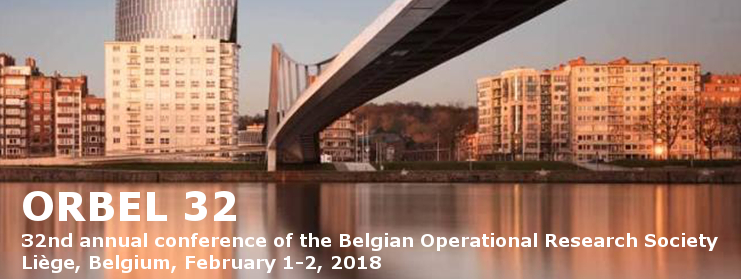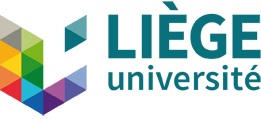 |
| |

|
|
| |
|
Schedule
Click on a link for more details
Show all the abstracts
Download the booklet of abtracts
Thursday 11:00 - 12:20 Routing Problems
Room 138 - Chair: Pieter Vansteenwegen
Thursday 11:00 - 12:20 Emergency operations scheduling
Room 130 - Chair: El-Houssaine Aghezzaf
Thursday 11:00 - 12:20 Algorithm design
Room 126 - Chair: Gerrit Janssens
Thursday 11:00 - 12:20 Multiple Objectives
Room 120 - Chair: Filip Van Utterbeeck
Thursday 13:30 - 14:50 Integrated logistics
Room 138 - Chair: Kris Braekers
Thursday 13:30 - 14:50 Person transportation
Room 130 - Chair: Célia Paquay
- Local evaluation techniques in bus line planning
Evert Vermeir (KU Leuven)
Co-authors: Pieter Vansteenwegen
- Integrating dial-a-ride services and public transport
Yves Molenbruch (Hasselt University)
Co-authors: Kris Braekers
- Benchmarks for the prisoner transportation problem
Jan Christiaens (KU Leuven)
Co-authors: Tony Wauters, Greet Vanden Berghe
Abstract:
This paper formally introduces a new problem to the operational research academic community: the Prisoner Transportation Problem (PTP). This problem essentially concerns transporting prisoners to and from services such as hospitals, court and family visits. Depots are located across a geographic region, each of which is associated with several special prisoner transportation trucks which themselves are subdivided into compartments prisoners may share with others. The PTP constitutes a variant of the commonplace vehicle routing problem, but more specifically the dial-a-ride problem. Two unique constraints make it a particularly interesting problem from a research context: (i) simultaneous service times and (ii) inter-prisoner conflicts. Simultaneous service times mean that prisoners may be processed simultaneously rather than sequentially, as is standard throughout most vehicle routing and delivery problems. Meanwhile, compartment compatibility means that each individual prisoner may be either permitted to share the same compartment with another prisoner, unable to share the same compartment, or they may be unable to share even the same vehicle. The inclusion of this additional constraint results in a very computationally challenging problem. The algorithm developed and employed to solve this problem does not represent this work's primary contribution. Rather the much more fundamental task of introducing and modelling this problem's properties and unqiue constraints constitutes the primary research interest. Given that the problem has never been formalised by the academic community, it continues to be solved primarily by manual planners who spend multiple hours working on a solution for the following day. These solutions are often infeasible or violate hard constraints. The ruin & recreate algorithm proposed by the current paper significantly improves upon these manually-constructed solvers and only require approximately ninety seconds of runtime. Computational results will be presented and analysed in detail. Furthermore, the academic instances which were generated and employed for experimentation will be made publicly available with a view towards encouraging further follow-up research.
- Optimizing city-wide vehicle allocation for car sharing
Toni Wickert (KU Leuven)
Co-authors: Federico Mosquera, Pieter Smet, Emmanouil Thanos
Thursday 13:30 - 14:50 Continuous models
Room 126 - Chair: Nicolas Gillis
Thursday 13:30 - 14:50 Integer programming
Room 120 - Chair: Bernard Fortz
Thursday 15:20 - 16:20 Material handling and warehousing 1
Room 138 - Chair: Greet Vanden Berghe
Thursday 15:20 - 16:20 Operations management
Room 130 - Chair: Roel Leus
Thursday 15:20 - 16:20 Matrix factorization
Room 126 - Chair: Pierre Kunsch
Thursday 16:30 - 17:10 Material handling and warehousing 2
Room 138 - Chair: Katrien Ramaekers
Thursday 16:30 - 17:10 Routing and local search
Room 130 - Chair: An Caris
Thursday 16:30 - 17:10 Traffic management
Room 126 - Chair: Joris Walraevens
Thursday 16:30 - 17:10 Pharmaceutical supply chains
Room 120 - Chair: Bart Smeulders
Friday 10:50 - 12:10 Optimization in health care
Room 138 - Chair: Jeroen Beliën
Friday 10:50 - 12:10 Network design
Room 130 - Chair: Jean-Sébastien Tancrez
Friday 10:50 - 12:10 Local search methodology
Room 126 - Chair: Patrick De Causmaecker
Friday 10:50 - 12:10 ORBEL Award
Room 120 - Chair: Frits Spieksma
Friday 13:00 - 14:00 Production and inventory management
Room 138 - Chair: Tony Wauters
Friday 13:00 - 14:00 Logistics 4.0
Room 130 - Chair: Thierry Pironet
Friday 13:00 - 14:00 Data clustering
Room 126 - Chair: Yves De Smet
Friday 13:00 - 14:00 Collective decision making
Room 120 - Chair: Bernard De Baets
Friday 14:10 - 15:10 Sport scheduling
Room 138 - Chair: Dries Goossens
Friday 14:10 - 15:10 Discrete choice modeling
Room 130 - Chair: Virginie Lurkin
Friday 14:10 - 15:10 Data classification
Room 126 - Chair: Ashwin Ittoo
|
|
| |
ORBEL - Conference chair: Prof. A. Arda -
Platform: Prof. M. Schyns.
|
|
 |
|





